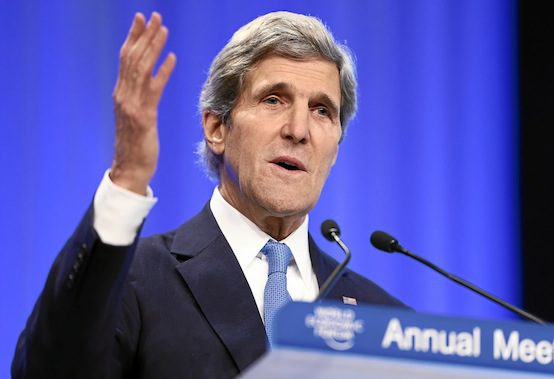The Most Awful and Absurd Foreign Policy Quotes from 2015

Micah Zenko presents his list of the 20 “best worst” quotes from politicians and officials over the last year. Following his example, I’ll add on a few more that are at least as bad as the ones he included.
1) John Kerry on Yemen (November 23, 2015, remarks with foreign minister of the United Arab Emirates):
We respect what United Arab Emirates has been able to do to be able to accomplish significant progress in Yemen. We understand completely and support the reasons that Saudi Arabia and the UAE felt compelled to take acts of self-defense and to protect the security of this region. And I know that the UAE has made sacrifices in that effort. We understand those sacrifices in the United States, and we respect what has been achieved, and we respect the values that the UAE is standing up for.
Here Kerry offers up a complete whitewash of the Saudi-led coalition’s wrongdoing in their war on Yemen and endorses their specious justification for intervention. The quote from Kerry briefly sums up most of what’s wrong with Obama administration support for the appalling and indefensible Saudi-led war.
2) Marco Rubio (January 20, 2015, Bill O’Reilly Show):
Shia actually wants there to be an apocalyptic showdown because they believe that that will then usher in the appearance of the hidden — the 13th imam…I mean you listen to their speeches, they’re very clear about that.
There is no 13th imam. Shia clerics and Iranian officials don’t say anything like this in their speeches. Rubio was repeating a thoroughly discredited lie about Iran as the “martyr-state.”
3) Lindsey Graham (September 16, 2015 during the second presidential “undercard” debate):
Do you think Putin would be in Ukraine or Syria if Reagan were president?
As I noted at the time, when Reagan was president the Soviets were in both places. A more complete response to this absurd statement is that the Soviets were in Afghanistan and almost all of eastern Europe for both of Reagan’s terms in office, and they were exercising influence in many other countries for the entirety of Reagan’s presidency. If Graham had been in Congress when Reagan was president, he probably would have been one of the loudest detractors of Reagan the “appeaser” and would have condemned him for his “weak” policies. Finally, it takes a genuinely naive confidence in the power of “leadership” and “resolve” to believe that by having a different president in Washington another major power will be deterred from acting to defend what it considers to be its interests.
4) Chris Christie (October 12 on MSNBC):
My first phone call would be to Vladimir, and I’d say, “Listen, we’re enforcing this no-fly zone. And I mean we’re enforcing it against anyone, including you. So don’t try me. Don’t try me. Because I’ll do it.”
Christie would either engage in a high-risk bluff for the sake of a bad cause in Syria, or he would actually start a shooting war with Russia for the same reason. He has been going out of his way this fall to make himself the “WWIII candidate” and confirming that he should never be trusted with any real power.
5) Hillary Clinton (October 13 Democratic debate):
Our response [in Libya], which I think was smart power at its best, is that the United States will not lead this. We will provide essential, unique capabilities that we have, but the Europeans and the Arabs had to be first over the line.
The fact that Clinton thinks “smart power at its best” involves being dragged into an unnecessary war by allies and clients in a civil war in which the U.S. had nothing at stake tells you everything you need to know about her foreign policy judgment and the value of her version of “smart power.”
6) John Kasich on a Syrian “no-fly zone” (December 15, 2015, fifth Republican main debate):
It’s time we punched the Russians in the nose.
Kasich has been trying his hardest to be one of the most combative and hawkish candidates in the Republican field, and his performance that night was no exception. The reckless desire to “punch” another major power in the nose regardless of the consequences sums up his approach of confrontation for its own sake.
7) Carly Fiorina (December 15, 2015, also at the fifth Republican main debate):
I have done business in China for 25 years, so I know that in order to get China to cooperate with us, we must first actually retaliate against their cyber-attacks so they know we’re serious. We have to push back on their desire to control the trade route through the South China Sea through which flows $5 trillion worth of goods and services every year.
We cannot let them control the disputed islands, and we must work with the Australians, the South Koreans, the Japanese and the Filipinos to contain China. And then we must ask for their support and their help with North Korea.
While major powers may sometimes be able to keep different issues separate and compartmentalized, it is almost never possible to attack and thwart a major power on every other issue and then expect it to be willing to provide your government with assistance that it has previously been unwilling or unable to provide. Fiorina’s idea that intensified confrontation and hostility will make the Chinese government more cooperative on a major issue flies in the face of past dealings with China and most other governments.
Comments